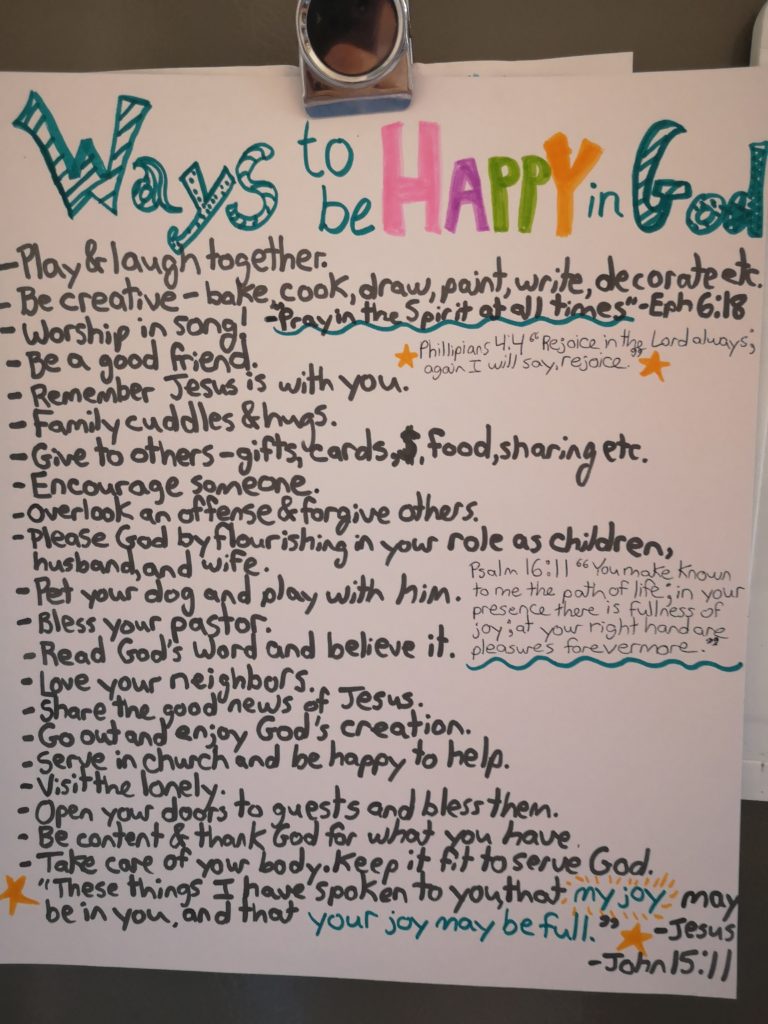Note from Randy: In my books on happiness, I give considerable attention to the biblical teaching that God is happy. Why? Because only when we understand this can we believe that God wants us to be happy in Him. Scripture makes this statement about imitating Jesus: “Whoever says he abides in him ought to walk in the same way in which he walked” (1 John 2:6). If Jesus walked around mostly miserable, we should be miserable too. If He was happy, we should be happy. (If we’re to be Christlike, we’d better learn what Christ is like!)
If God is happy, then this world’s unhappiness is a deviation from God and His original design. Scripture reveals that even our present struggles, which trigger unhappiness, are part of His larger plan to bring greater and everlasting happiness. Even here and now, God’s children have every reason to be the world’s happiest people: “May all those who seek you be happy and rejoice in you!” (Psalm 40:16, NET). “You are the Lord’s people! So celebrate and praise the only God” (Psalm 97:12, CEV).
The article below was sent to me by reader Charlene Nelson, who describes her journey in discovering the happiness God offers His children. Thanks, Charlene, for sharing how Happiness has encouraged you along the way. (Don’t miss the great list of “Ways to be happy in God” she shares at the end! It might inspire you to write your own.)
My first love, much like yours, was happiness. The measure of a day was how happy it made me feel. Tedious tasks like attending class at school had to be accompanied by some kind mischief in order to enjoy it. The hunt for happiness was my slave-driver. As a teen, it often stole my sleep. I was a late (late) driver, so I often walked down the mountain I lived on to get to places, like 7-11 to have taquitos with my friends in the middle of the night. I can recount several mornings, when the sun was rising, hauling my exhausted self uphill to get back home.
To me, happiness looked like fun, as much fun as I could muster. Silence and aloneness were my enemies, because they forced me to think more seriously about my life—something I was desperate to avoid. So much to my parents’ chagrin, I either had my music blaring, or I was out, running around seeking some kind of thrill, no matter how small.
When I became a Christian at age 18, I found happiness. For a long time, I was so filled with joy that I could hardly do my makeup in the morning, since happy tears kept pouring down my face washing it off. I no longer had to lie down in dread and rise in anxiety. At last I could rest, not needing to thrill-seek tirelessly, running my body into the ground trying to avoid my aching conscience.
Perhaps, I thought I killed my pleasure idol, but it was rooted deeper than I knew. It is, as you know, ingrained in all of us.
Early in my marriage, Brent and I drove out of town to see Fantastic Mr. Fox. Our small town didn’t have a large movie theater then, so it was a rare occasion to see a movie on a big screen. I ended up hating that movie, cringing until it was finally over.
I was angry on our drive home. Angry at the people that could make such a stupid movie. Angry that we wasted our drive, our money, and our time. Angry because “I just wanted to have fun” and that movie hadn’t delivered. I was immature, naive, and selfish—let’s get that straight.
It wasn’t the last of my anger. Chronic pain became a constant hindrance to the fun I wanted to have in life and made even simple tasks seem torturous to me. So anger has been my personal sin beast to battle, and working through it, along with my desire for constant happiness, has been a long, tedious work.
Somewhere along the way, I concluded that God Himself did not want me happy. Or if I was to be happy, I must only be meant to find happiness in prayer, worship, Bible reading, and obedience to clear commands, but if I tried to enjoy some other activity for a minute, God would probably be mad and smash me for it. He was the cosmic-killjoy. He was the chain locked box and handcuffs; I was the struggling escape artist.
Along my way, I have had to learn many truths to correct this damaging and offensive thinking. One book I read recently that has been a great help to my mind and soul is Happiness by Randy Alcorn. It is a great complimentary read to the classic Desiring God by John Piper, and I found it helped flesh out the practicalities of finding joy and satisfaction in God. The back cover reads:
Christians are supposed to be happy. In fact, we are supposed to radiate joy, peace, and contentment that is so unmistakable and so attractive that others are naturally drawn to us because they want what we have. And yet, in today’s culture, the vast majority of Christians are perceived as angry, judgmental people who don’t seem to derive any joy from life whatsoever. So why aren’t we happy?
Unfortunately, many Christians are taught early on that God doesn’t want us to be happy (he wants us to be holy). In fact, many Christians are laboring under the false notion that God himself is not happy. But nothing could be further from the truth! God does want us to be happy. The Bible is filled with verses that prove that ours is a happy, joy-filled God who not only loves celebrations but also desperately wants his children to be happy. Why else would He go to the lengths He did to ensure our eternal happiness in His presence? We know that we will experience unimaginable joy and happiness in Heaven, but that doesn’t mean we can’t also experience joy and happiness here on earth.
In Happiness, noted theologian Randy Alcorn dispels centuries of misconceptions about happiness and provides indisputable proof that God not only wants us to be happy, He commands it.
I have heard that exact line so many times (“God wants us holy, not happy”), and I agree that it contributes to untold, unnecessary suffering in the lives of Christians. One of the other common misconceptions Randy helps us with is that there is a fundamental difference between happiness and joy, joy being spiritual and happiness unspiritual, among many other popular fallacies. This book is full of Scripture, from cover to cover, and readers will gain a robust biblical depth of knowledge on the topic of happiness.
It has helped me to recover the truth that God desires my happiness, and that finding joy in the little things in life is part of discovering joy in God, the giver of every good gift. My joy and eagerness to love and serve others has also been increased. Clearly, I cannot recommend this book enough.
I recently read Psalm 34, the psalm that famously says, “Oh taste and see that the Lord is good!” (verse 8). It also says in verses 12-14:
“What man is there who desires life
and loves many days, that he may see good?
Keep your tongue from evil
and your lips from speaking deceit.
Turn away from evil and do good;
seek peace and pursue it.”
The questions “Who desires life? Who wants to love and enjoy a long and good life?” assumes the response is everybody. The Bible knows—God knows—you want to enjoy your days. Even when life is hard, I find I do best to wake up saying “God must have some happiness in mind for me today,” and then to make it my aim to enjoy what He has planned, as far as I am able, with thankfulness in my heart to God. It sure beats pessimism (which I can still be prone to).
After reading Happiness I promptly wrote this list of reminders for my fridge. They make me smile often and serve as a reminder to what I often forget. I hope you read this book, and that it helps you as it has helped me.

This article originally appeared on Charlene Nelson’s blog, Come to Christ.
Photo: Unsplash




